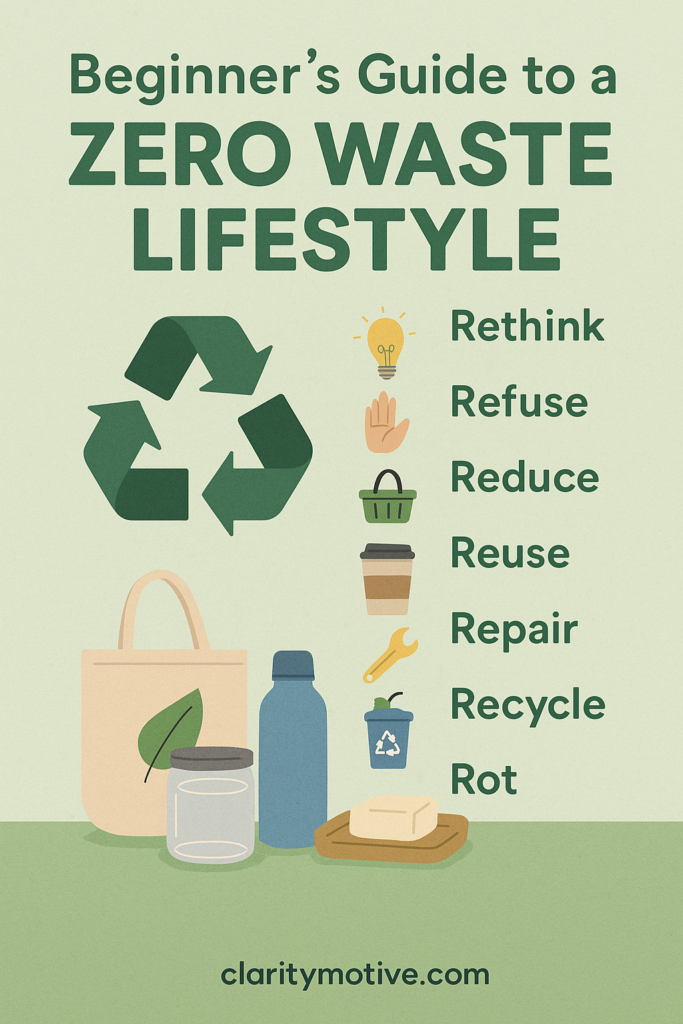Why Zero Waste Lifestyle Matters?
In our modern world, where convenience often leads to excessive waste, adopting a zero waste lifestyle is more than a trend, it’s a conscious choice towards sustainability. But what does it truly mean to live a zero waste lifestyle? Is it feasible in today’s fast-paced society? Absolutely. With intentional actions and a shift in mindset, anyone can begin on this rewarding journey.

Understanding the Zero Waste Lifestyle
Living a zero waste lifestyle means trying to create as little trash as possible. Instead of throwing things away, the goal is to find ways to refuse what we don’t need, reduce what we use, reuse what we already have, recycle properly, and compost what we can. It’s all about making small choices every day that are better for the planet and better for us.
Key Aspects:
- Refuse: Avoid products that generate unnecessary waste.
- Reduce: Limit consumption and opt for quality over quantity.
- Reuse: Choose reusable items over single-use products.
- Recycle: Properly sort and recycle materials when reuse isn’t possible.
- Rot: Compost organic waste to enrich soil and reduce landfill contributions.
The 7 R’s of Zero Waste Living
You might’ve heard of the 3 R’s – reduce, reuse, recycle. But the zero waste lifestyle goes even deeper. There are actually 7 R’s that guide this way of living. Each one helps you make smarter choices and waste less in your day-to-day life.

- Refuse – Decline unnecessary items and packaging.
- Reduce – Minimize consumption and waste generation.
- Reuse – Opt for reusable alternatives in daily life.
- Repair – Fix items instead of discarding them.
- Recycle – Process materials to create new products.
- Rot – Compost organic matter to return nutrients to the earth.
- Rethink – Continuously evaluate and adjust habits for sustainability.
Practical Examples of Zero Waste Living
Drawing inspiration from leading zero waste advocates, here are actionable steps to integrate into daily life:
- Kitchen: Embrace bulk shopping with your own containers, and store food in glass jars.
- Bathroom: Switch to bar soaps, bamboo toothbrushes, and refillable hygiene products.
- On-the-Go: Carry a reusable water bottle, coffee cup, and utensils.
- Shopping: Use cloth bags and support local markets to reduce packaging waste.
- Cleaning: Create DIY cleaning solutions using natural ingredients like vinegar and baking soda.
Getting Started: How to Be a Zero-Waste Person
Starting a zero waste journey can be simplified with these steps:
- Conduct a Waste Audit: Assess the types and quantities of waste you produce.
- Set Achievable Goals: Focus on one area at a time, such as eliminating plastic bags.
- Educate Yourself: Utilize resources from reputable zero waste blogs and communities.
- Join a Community: Engage with local or online groups for support and idea sharing.
- Be Patient: Recognize that transitioning to zero waste is a gradual process.
Understanding Zero Waste Techniques
Zero waste techniques involve strategies to redesign resource life cycles so that all products are reused, and no trash is sent to landfills or incinerators. This includes:
- Product Design: Creating items with end-of-life recyclability in mind.
- Circular Economy: Encouraging systems where waste is repurposed as a resource.
- Community Initiatives: Implementing local programs like composting and repair workshops.
Benefits of Adopting a Zero Waste Lifestyle
- Environmental Impact: Reduces pollution and conserves natural resources.
- Health Advantages: Minimizes exposure to harmful chemicals found in plastics.
- Economic Savings: Decreases spending by reusing and repurposing items.
- Enhanced Well-being: Promotes a minimalist lifestyle, reducing stress and clutter.
Conclusion: Embracing the Zero Waste Journey
Transitioning to a zero waste lifestyle is a continuous journey of learning and adaptation. By making conscious choices and seeking inspiration from established zero waste communities, you contribute to a more sustainable and fulfilling way of life.

